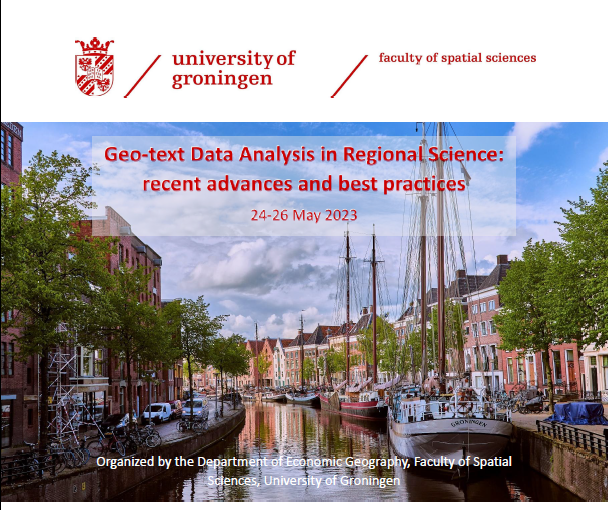
Background and objectives
The exponential growth of ‘big data’ coupled with enhanced computational capacity and high-performance machine learning techniques provides high-potential research opportunities for the field of Regional Science. User-generated text data is of particular interest, as it often has implicit spatial information embedded within (e.g., informal place references, place relations, place opinions/emotions). These types of geo-text data (Hu, 2018) can shed new light on regional economic development, labor market dynamics, and geographies of knowledge production and knowledge relations in a way that traditional secondary data cannot. Some studies in regional studies have already used this new geo-text approach, for example, the digital footprint of interfirm linkages (Kinne and Axenbeck 2020; Abbasiharofteh, Kinne, and Krüger 2021), Twitter data and news items (Ozgun and Broekel 2021), online job vacancies (Acemoglu et al. 2020), but also digitized historical newspaper archives (Peris, Meijers, and Van Ham 2021).
Textual data offers numerous advantages. It gives us the ability to create a bottom-up classification of groups and definitions rather than relying on existing definitions. Combined with web scraping techniques, it allows for high-volume flexible yet robust analysis. But there are also challenges concerning the reproducibility of results and online-data bias; nevertheless, geo-text analysis holds great promise for regional science research and should be leveraged much more than currently.
The aim of the geo-text workshop is threefold. First, this workshop invites leading experts to deliver keynote talks on their latest research findings on the topic and showcase recent methodology development. Second, this program creates a venue where about 20 early career researchers and PhD students in regional science learn from one another and discuss future research ideas and potential collaborations. All participants will be able to present their work and receive feedback from senior scholars and their peers. We would like to also encourage the exchange of information on the skills needed to perform text analysis, and we will have technical ‘sweat’ sessions in the program. Lastly, the workshop includes a social event and other opportunities to facilitate informal knowledge exchange, discussions, and brainstorming to inspire the next generation of researchers to take the next step.
Keynote speakers and publication options
We are happy that four distinguished scholars in the field of regional sciences will attend the workshop. Besides delivering keynote talks on the recent advances, case studies, and future challenges in using geo-text data analysis, they provide valuable feedback to presenters. The invited guests are:
- Tom Brökel, University of Stavanger, Norway
- Rikard Eriksson, Umeå University, Sweden
- Martin Henning, University of Gothenburg, Sweden
- Evert Meijers, Utrecht University, the Netherlands
A selected number of high-quality papers presented at the workshop will be proposed for further consideration in a special issue of an academic journal.
Submissions
We invite PhD students and early career researchers (five years between the date showing on their PhD certificate and the workshop date) to send us an extended abstract (max. 1000 words) featuring original and unpublished research on text analysis applied in geographic research, including but not limited to the following topics:
- geo-text mining - geographies of knowledge production
- novel datasets and analytical methods - geographies of green transition
- regional economic development - diffusion of clean technologies
- labor market dynamics - knowledge relations
- regional occupation space - place-based policy
To allocate enough room for discussion and feedback, each presenter has 45 minutes (including Q&A) to present his/her research.
Please send your extended abstract by 15 March to This email address is being protected from spambots. You need JavaScript enabled to view it. which includes your name and affiliation.
Important dates*
Paper submission deadline: 15 March 2023
Acceptance notification: 31 March 2023
Material submission for discussants: 15 May 2023
Workshop days: 24-26 May 2023
* All deadlines are at 11:59 CET on the corresponding date
Workshop organization and costs
The workshop will be held in the vibrant city of Groningen, known for its rich history, charming canals, cobbled streets, and thriving cultural scene. The faculty of Spatial Sciences at the University of Groningen is recognized internationally for excellence in research and teaching in spatial and regional sciences. The geo-text workshop is planned as a three-day event, organized in a workshop atmosphere with keynote talks and thematic paper sessions with PhD students and early career researchers’ presentations. The workshop includes a lightning session and a tutorial.
Participation in the workshop itself is free of charge. We booked hotel rooms for presenting participants. We cover the costs of the hotel, and the workshop includes lunches, refreshments, and two dinners. Participants need to cover other costs associated with their travel themselves. The workshop is supported by the Regional Science Association International (RSAI) and the European Regional Science Association (ERSA) and facilitated by the Jantina Tammes School for Digital Society, Technology, and Artificial Intelligence.
